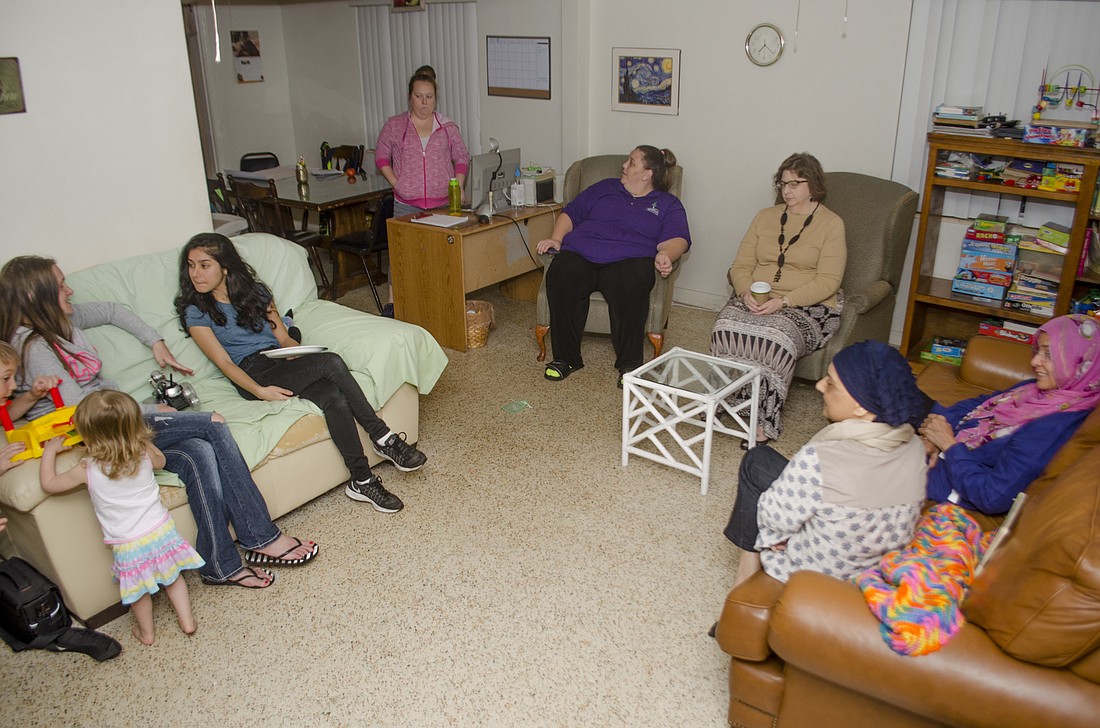- November 23, 2024
-
-
Loading

Loading

Becky Taylor wasn’t trying to make a statement when she reached out to the Islamic Society of Sarasota and Bradenton to join her organization, Family Promise.
It was late July. It was before anti-Muslim rhetoric bubbled over on Jan. 27 when President Donald Trump signed a now jettisoned executive order prohibiting people from seven predominantly Muslim countries from entering the United States.
Taylor, network director for Family Promise of Sarasota, said she had no agenda. She was just trying to honor the roots of her organization.
Family Promise offers a safety net to families falling into homelessness. Through a network of partner congregations, it offers food, housing and support in an effort to reroute a family’s path away from homelessness.
With Family Promise partner Temple Beth Sholom, its mission has been primarily carried out by Christian churches, until now.
“Family Promise was founded as an interfaith hospitality network, and we decided that we were going to take that very literally and reach out to all faiths in our community,” Taylor said. “I just felt that it was important to include everyone.”
It's a feeling Taylor shares with many others in the Sarasota community.
Although the mosque has always welcomed visitors, Islamic Society of Sarasota and Bradenton volunteer Amani Makarita said lately more people have expressed interest in visiting.
“We’ve had a lot of people calling to tell us they want to support us and they feel we belong here, and they just want to meet a Muslim. Some of them have never met a Muslim before,” Makarita said.
Easing interfaith relations was not the express impetus for Taylor’s invitation, but she concedes her organization’s most recent partnership could do just that.
“No one is openly saying ‘I am doing this for interfaith relations,’ but … maybe we are doing a little for (interfaith relations),” Taylor said. “Just because we are doing it.”
The Islamic Society eagerly accepted Taylor’s invitation. After months of conversations, the mosque, Sarasota’s only place of worship for Muslim residents, formally joined Family Promise as a host congregation in late 2016.
“Part of our belief is to help and serve …” Makarita said. “It was a great opportunity, because it was just handed to us, really.”
Now, with her small army of volunteers, Makarita works to serve the three families being helped by Family Promise. Each week, a different congregation helps care for the families, including providing dinner.
“We are part of the community, and we want to give. When your community needs it, you have to give in the form of Zakat (charity). It’s one of the pillars of Islam. It’s an obligation."
“We’ve had a lot of people who want to cook,” Makarita said. “We love to feed people.”
Dinners follow a practiced pattern. It's chaotic. But it’s a comfortable chaos of coaxing children to eat while the older children arrive from school.
Taylor encourages her congregations to treat Family Promise families like they would their own family, with one small exception when preparing food.
“Keep the spices down to a minimum,” Taylor advised Makarita’s volunteers, “But bring things that you might serve at home … that’s what Amani’s volunteers have done, and the kids are eating it and loving it."
Meals follow the familiar rhythm. Three family members dish out dinner buffet style, scooping rice, vegetables and chicken onto paper plates. After the children are fed, the adults sit with Islamic Society volunteers around a rectangular table while youngsters play on a computer.
The choreographed routine was set to the murmur of small talk.
“It’s delicious,” someone complimented the cook. “I love the cabbage.”
Taylor said she believes that will be the impact of the partnership — the moments when volunteers and families are able to share their culture through food.
“I think that’s probably going to be the best legacy right there,” Taylor said. “Our kids have now been exposed to the food. They have sat and played games with women wearing hijabs ... they were just family.”
Although many volunteers are happy to share their culture, that wasn’t what attracted them to the program.
“We are part of the community, and we want to give,” volunteer Nazia Abid said.
In Islam, she said, whatever you have is a result of a community.
“When your community needs it, you have to give in the form of Zakat (charity). It’s one of the pillars of Islam. It’s an obligation,” she said.
“We are part of the community, and we want to give,” volunteer Nazia Abid said.
In Islam, she said, whatever you have is a result of a community.
“When your community needs it, you have to give in the form of Zakat (charity). It’s one of the pillars of Islam. It’s an obligation,” she said.